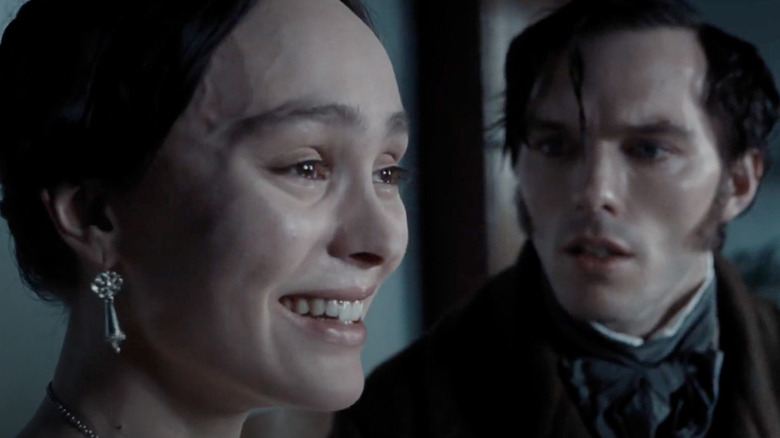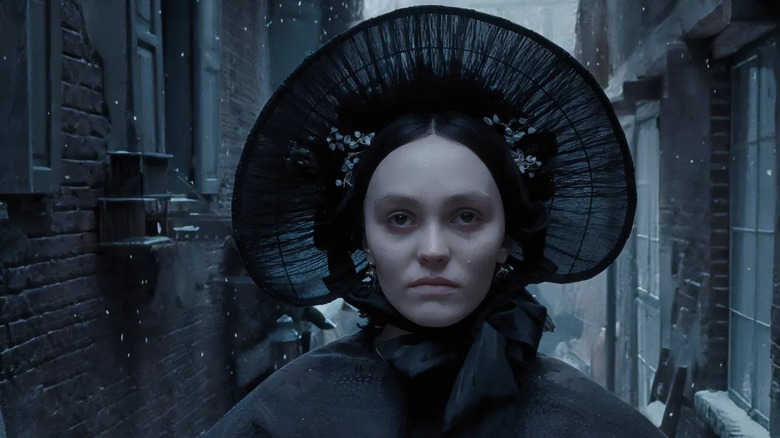The Most Powerful Directorial Choice In Nosferatu Is Nearly Invisible
Robert Eggers may not be known as an action director, but he can direct action. His bloody Viking epic "The Northman" proved that. So it's fascinating to watch his new take on "Nosferatu," the "Dracula but not really but also it's Dracula" vampire classic, and realize how much it rejects all attempts at cinematic action.
"Dracula," and by extension, "Nosferatu," is an inherently thrilling story. A powerful vampire comes to town and a group of men and women assemble to combat him. By its very nature, it's the kind of tale that drips with suspense, tension, and yes, even action — anything involving men armed with torches and weapons marching toward an immortal killer's tomb to enact vengeance should get the blood pumping by default. That's just how stories work.
So why isn't "Nosferatu" exciting? And don't get me wrong, I ask this question as a compliment. Eggers' blend of stark terror and gothic melodrama is one of the best movies of the year, and one of the most exciting horror movies in a year filled with exciting horror movies, but its deliberate pacing and patient, feverish tone work overtime to make sure you're never experiencing a visceral thrill while watching it. It curdles into your mind, and maybe your nightmares, and sticks on you like a layer of grease you can't quite wash off. It makes you feel filthy, and even the moments of triumph ring hollow, never inviting that sense of celebration that so often accompanies a heroic victory or action beat in any other movie.
How it works is very simple and all about the fundamentals. It's all about how Eggers deploys his camera, and it's subtle enough that you may not even notice it at first.
Nosferatu is a horror movie about how powerless we truly are
Because we know Eggers can and has directed traditionally exciting action, the lack of action in "Nosferatu" is a clear creative choice. One of the best examples of Eggers rejecting action comes early in the film, when Thomas Hutter attempts to escape Count Orlok's castle. Other directors may have filmed this sequence with speed and intensity, perhaps alternating close-ups with a quickly roving camera. This certainly would've made the scene exciting, and would've put the audience in Thomas' shoes directly. Instead, Eggers films this desperate man and his desperate actions from a distance, framing him in wide shots where he's dominated by his foreboding prison. When he does move quickly, the camera tends to slowly pan with him, capturing the action beat but making it feel helpless and pitiful. We are not in Thomas' shoes. We are not feeling his adrenaline rush. We are an isolated observer, watching from afar as he is completely and utterly powerless in the face of something that makes every determined human action feel utterly useless.
Every human action in "Nosferatu" feels ... small. Only the all-powerful Orlok is allowed to dominate the frame, and the film only employs fast cutting or other typical tools of action cinema when he emerges from the shadows to prey upon a victim. The vampire is filmed with the visual language associated with power, while every human character might as well be an ant crawling through the dirt. We watch them wander, and they look so weak and so alone.
The wide shots, the static shots, and the graceful but glacial camera movements continue throughout the entire movie. It should be exciting when the "men on a mission" gather for the final journey into Orlok's lair, but Eggers doesn't allow it to be. After all, their quest is a wild goose chase, and the vampire's defeat comes elsewhere, via a character who realizes the only way to defeat him is to surrender entirely. To give in to inaction.
Lots of horror movies are about defeat, and about how frail we are in the face of things that want to harm us. But "Nosferatu" is the rare film to actually make us feel it in our bones.
I talked about this (and the rest of my favorite films of 2024) on the latest episode of the /Film Daily podcast, which you can listen to below:
You can subscribe to /Film Daily on Apple Podcasts, Overcast, Spotify, or wherever you get your podcasts, and send your feedback, questions, comments, concerns, and mailbag topics to us at bpearson@slashfilm.com. Please leave your name and general geographic location in case we mention your e-mail on the air.

